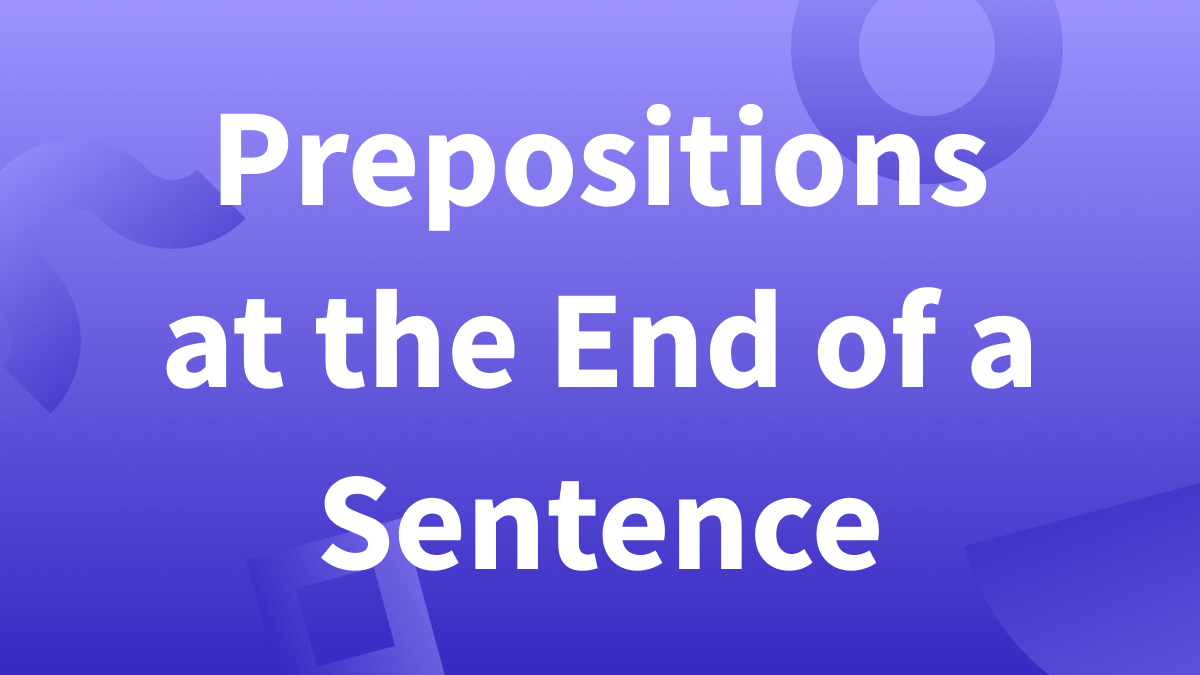Correct Use
- A preposition connects a noun or pronoun to other information in a sentence.
- A few examples of prepositions are about, before, by, for, and with.
- It’s common (and acceptable) to end a sentence with a preposition in casual speech and writing.
- ○ Who are you going to go shopping with?
- ○ With whom are you going to go shopping?
Dangling Prepositions in Formal Writing
The English language is constantly evolving, and with it, the rules of grammar. For instance, nowadays, it’s acceptable to use the word who instead of whom. To truly understand English grammar is to understand that the rules are flexible and not always set in stone. Take, for example, “never end a sentence with a preposition.” This rule does not have to be meticulously followed.
In everyday speech and writing, you might notice that ending a sentence with a preposition is quite natural. Deciding to follow this rule or not depends on the scenario. It’s okay to disregard it in an email to a friend or if you’re having a conversation with a colleague. But, if you’re writing in an academic or professional setting, do the extra work and stick that preposition inside the sentence.

Prepositions—What Are They?
A preposition is a word that shows the relationship between content words. They can also introduce prepositional phrases that have multiple words.
I need to turn in this report before I go on vacation.
He was nervous during the soccer match but elated when his team won.
Below you’ll find a few of the most common prepositions.
Prepositions can be challenging for English language learners because several types of prepositions have different functions, and some prepositions fall under more than one category. For example, at, in, and on are usually prepositions of time, but at and in are also prepositions of location.
- Prepositions of Time
We are going to lunch at one o’clock.
On Thursdays, we have our weekly meeting.
I was born in the year 1994.
- Prepositions of Location
Christopher was at his house.
Christopher was in his house.
Quick Tip
The word preposition has the word position in it, and this can serve as a reminder that prepositions sometimes tell the “position” of something.
Ending a Sentence with A Preposition
Generally, your writing does sound more eloquent if it doesn’t have a dangling preposition. But the fact is, it’s common for a sentence to end in a preposition in our day-to-day writing, conversation, and even our thoughts.
But maybe you have to write something formal, like a dissertation, a cover letter, or a legal contract. This type of text usually requires proper grammar, so avoiding dangling prepositions would be the way to go. When necessary, sentences that end with a preposition can be restructured. Here are a few examples:
He showed off the cooking skills he is known for. → He showed off the cooking skills for which he is known.
I want to know where you got that beautiful purse from. → I want to know from where you got that beautiful purse.
What office does he work in? → In which office does he work?
Remember that it’s also possible to omit the prepositional phrase, and your sentence would still be grammatically correct:
I went swimming on Monday. → I went swimming.
Phrasal verbs, however, require a preposition.
I went to look for the perfect gift.
I went to look the perfect gift.
A quick search about prepositions on the internet might lead you to one of the many variants of a quote, often attributed to former British Prime Minister Winston Churchill. After being criticized for always ending his sentences with a preposition, he cleverly responded:
This is the type of arrant pedantry up with which I will not put.
This is the attitude most people share when it comes to this archaic grammar rule. Don’t worry too much about it because ending a sentence with a preposition is something you can usually get away with.
What Is the Advice for Dangling Prepositions in Formal Writing?
Keep in Mind
- A preposition is a word that shows the relationship between content words.
- It’s okay to end a sentence with a preposition if you’re speaking or writing casually.
- If you’re writing something formal where impeccable grammar is a must, we suggest avoiding dangling prepositions.
“Never end a sentence with a preposition” is a guideline that doesn’t have to be strictly followed, but there are other grammar rules that should be adhered to if you want to impress with your writing. LanguageTool recommends these rules, checks spelling and grammar, and offers synonym and formatting suggestions that will make your text flawless.

